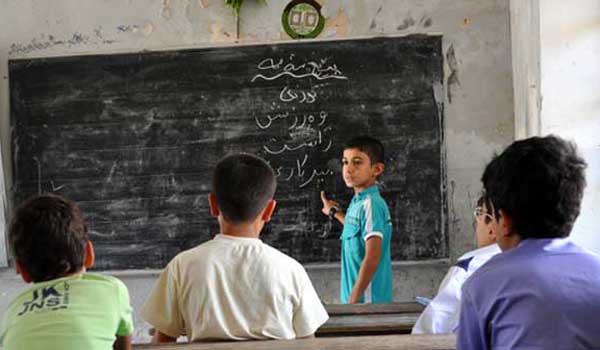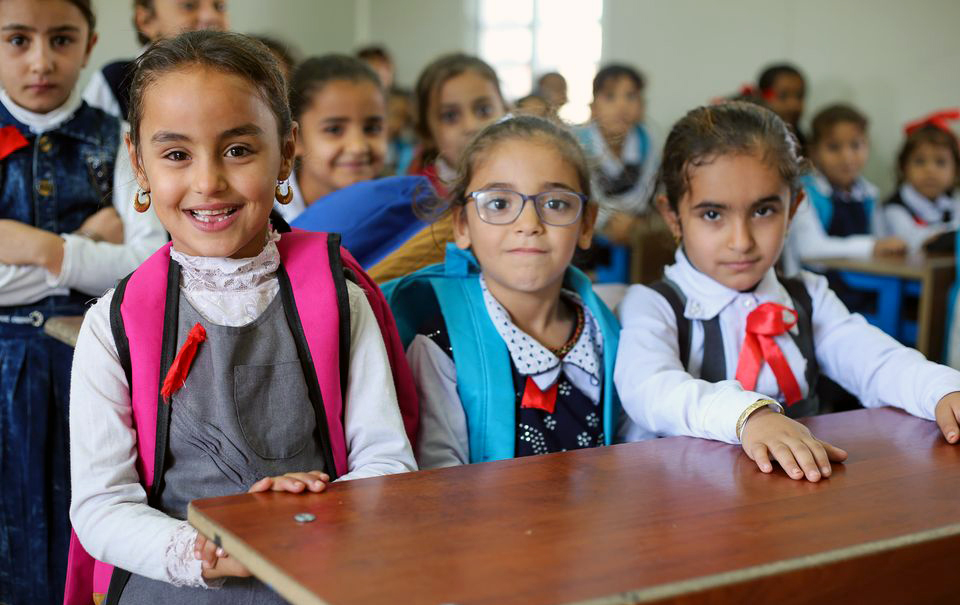Kurdish families of Kirkuk are taking out their kids from schools teaching them in their mother language, a dream came true in 2003 following the ousting of Saddam regime, into Arabic schools in the hope they get a better chance of employment post-graduation.
The families are voluntarily taking out their pupils since several years as they believe Arabic is the main language in the country and the pupils will face difficulties in the universities teaching in Arabic and English.
Shahla Bakir, 42, mother of three kids, has decided to send two of her kids from Kurdish schools to Arabic schools. She has decided to register the third kid in Arabic school from class one.
“We are concerned about their future. It was the best decision and we do not regret it. Kurdish education has many problems, it was not at the level of our ambition for our children’s education so we have taken this decision,” Bakir said.
Kurdish education has many problems, it was not at the level of our ambition
The oil rich city of Kirkuk, Iraq's second largest oil reserves, is ethnically a mixed province of Kurds, Sunni and Shiite Arabs, and Turkmen. It has long been at the center of disputes between Baghdad and the autonomous Kurdistan Regional Government KRG.
Article 140 of the Iraqi constitution in 2005 outlined a road map for disputed territories calling for normalization, census and referendum to determine its administration all in two years but only part of the first stage has been implemented up to the present.
Kurds, whom controlled Kirkuk till 2017 when the so-called Islamic State ISIS was ousted wanted Kirkuk, 238 kilometers north of Baghdad, to become part of the Kurdistan region, which has been opposed by the Arab and Turkmen populations.
Following the defeat of so-called Islamic State in 2017, Iraqi forces under operation (Law Imposing) took over control of the disputed territories in October 2017. Kurds lost the positions of Kirkuk governor and tens of admin and security positions.
Kurds in Kirkuk were happy for educating their kids their native language. The process was funded by the KRG which employed over 8,000 teachers which lamed in 2014 for irregular payment of monthly salaries and funding.
Hiwa Abdullah, 46, is father of three boys. Following October 2017, Abdullah felt Kurds are not the ruling majority in Kirkuk any more. “I felt Kurds are marginalized & graduates facing ethnic discrimination in employment by the government so we said it is better to make the kids our priority.”
“The political and ethnic conflict is so tense I am afraid Kurdish education will be useless for my children.” He decided to send his elder son from Kurdish into an Arabic school and registered the other two as well there.
“The political and ethnic conflict is so tense I am afraid Kurdish education will be useless for my children.”
Abdullah blamed the KRG for absence of job opportunities for graduates of Kurdish schools in Kirkuk. The KRG is suffering from a severe financial crisis due to tension with Baghdad over oil export and its revenues, Covid-19 pandemic, leaving aside corruption and mismanagement which generated poverty and unemployment.
The tension between Baghdad and Erbil in 204 has a negative impact on Kurdish education process in Kirkuk as the KRG was incapable of providing regular funding pushing the tutors for boycott and protest for several times.

Class of a Kurdish school in Kirkuk. Photo by KirkukNow.
There are no accurate official records of the pupils left Kurdish schools for Arabic ones but tens of tutors said tens of cases are registered on daily bases.
End of 2019, a group of Kurdish teachers and education experts launched a campaign under the name of (Education in mother tongue) to urge parents keep their kids in Kurdish schools following the escalation of the wave toward Arabic schools.
Salam Aziz, a teacher rejects turning back to Kurdish education in Kirkuk, said in some private schools teaching in Arabic, 700-800 pupils out of 1500 are Kurds who are not ready to join Kurdish schools.
Registration of children for class one under Kurdish education in Kurkuk has dropped by 3,000 for 2019-2020 curriculum year compared to last year, figures by Kurdish education directorate in Kirkuk shows, a reference that Kurdish families are no longer fanatic for their decades dream of mother tongue education.
Aziz desperately works on a project for amendment in Kurdish education in the disputed territories since 2017. “We need to make the students feel secure and that they will be employed in the future and the teachers to have same privileges of Baghdad -paid colleagues.”
“We need to make the students feel secure and that they will be employed in the future and the teachers to have same privileges of Baghdad -paid colleagues.”
He suggests to adapt curriculums in a way that is in harmony with the sensitive status of Kirkuk and the disputed territories that starts from Shingal, home for the ethno-religious minority of Ezidis on the border with Syria, via Mosul to Kirkuk up to Khanaqin in DIyalah on the border with Iran.
Aziz is desperate the Kurds failed to present a model that could have urged Arabs to follow them and join their schools alternatively.
He finds it necessary for the ministry of higher education to teach in both Kurdish and Arabic in the institutes and universities for high school graduates.
“My daughter has studied in Kurdish and now ate the university teaching is in Arabic. There is no law that supports her that she can take exams in Kurdish while we are the second official language in the country.
Aziz believes the case requires action by senior political decision makers.
Graduates of Kurdish classes are not taught the main language of the country perfectly, a s kill they miss in the race for employment in a country unemployment has hit 14% last year. Government employment has become a dream for generations of graduates as the central government suspended employment for surplus of civil servants in the public sector.
Mohammed Abdul-Manaf, passed high school in 2019 to study medicine at Mosul Medical instate and get a degree as a paramedic. “Our professors teach in Arabic while I can not neither speak nor write in Arabic. Abdul-Manaf has failed to get confirmation to transfer him to Kirkuk or the KRG institutes.
Iraqi law allows professors to teach in both languages yet no all of them speak both languages.
Abdul-Manaf is proud of native language education and calls on the KRG to sort out the issue of higher education.
Following 2017 events, supporters of Kurdistan Democratic Party KDP led by Masoud Barzani left Kirkuk for Erbil and never made it back, leaving gaps in Kurdish education in Kirkuk.
The political tension between Baghdad and Erbil left Kirkuk particularly about the disputed territories since years left Kirkuk thrive for the basic public services of power supply, drinking water, sewerage, health and education.
Garbage collection is one of the main challenges for people in their daily life in the last years in particular. Power shortage is blamed for low supply by Baghdad compared to the high demand by people for consumption.
Sherzad Rashid, director of Kurdish education in Kirkuk said they have taken steps to address the issue. The set of new rules includes ban of transfer of pupils ahead of passing class six but still parents insist on shifting schools.
“Some kids are doing very well in classes 4 and 5 yet the parents still insist to shift them to Arabic education, a matter of suspicion for us.”





